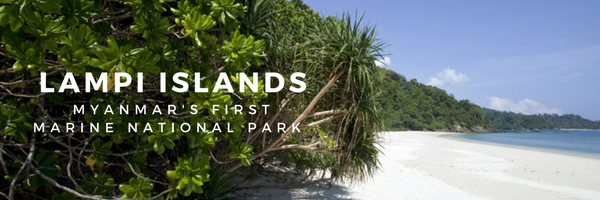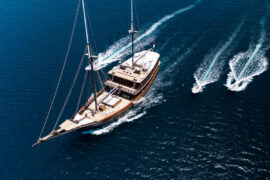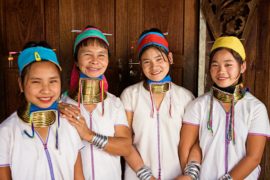 Located in the Mergui Archipelago in Southern Myanmar, the Lampi Marine National Park is Myanmar’s first marine national park area. The biodiverse islands are covered by tropical evergreen rainforests and surrounded by coral reef systems. The park area protects over 1000 species of animals, plants and marine life. Species found in the area include Hornbill birds, loggerhead turtles and dugongs.
Located in the Mergui Archipelago in Southern Myanmar, the Lampi Marine National Park is Myanmar’s first marine national park area. The biodiverse islands are covered by tropical evergreen rainforests and surrounded by coral reef systems. The park area protects over 1000 species of animals, plants and marine life. Species found in the area include Hornbill birds, loggerhead turtles and dugongs.
The namesake Lampi Island is the biggest island in the park. The island is made up of rocky coastline dotted with pristine sandy beaches and bays. Inland the island is covered with lush vegetation and evergreen forest. Many rare species of tree and plant life can be found on the island. Mangrove forests grow along rivers and fresh water sources on the island too.
Fauna on the island include a huge variety of birdlife, including many threatened species like the plain-pouched hornbill and the Wallace Hawk Eagle. A range of amphibians, reptiles as well as mammals including the sunda pangolin are also found on the island.
Surrounding the islands are rich coral reef systems, home to a wide range of marine life. Seagrass meadows can also be found that are an important food source for species like dugong and sea turtles.
The Lampi marine national park area is also home to several hundred of Merguis famed Moken sea gypsies. The main Moken village is located on Bo Cho Island on the southern tip of Lampi. The Moken have been living in the archipelago over a century, spending a majority of their time at sea embarked on long fishing trips. During the rainy season, when the waters are too rough, the Moken retreat to their stilted villages on the shores of the archipelagos islands. Traditional, the livelihood of the Moken was partially dependent spear fishing and diving to collect sea urchins and other marine life. As a result, the Moken have acquired a reputation for their diving skills and ability to stay under water for long periods of time.
Activities
A wide range of activities are on offer in the park area:
- Exploring the fresh water rivers and their surrounding mangrove forests by canoe.
- Park rangers can guide visitors on hikes through the lush jungle terrain and climb up to one of several hills to enjoy panoramic views of the island and surrounding sea.
- Snorkeling and diving on the rich coral reef systems and spotting sea turtles, rays and sharks.
- Observing sea turtles at several nesting sites around Lampi. Nighttime baby turtle hatching occurs from January to March.
- Visiting the local villages and Moken sea gypsies. Explore the local way of life and observe the Moken fishing way they have for a century.
- Take an island hopping trip by boat to the different islands in the park area
- With over 230 species of bird in the park, Lampi is a fantastic bird watching destination. Colonies of plain pouched hornbills can be spotted roosting during sunrise and sunset on the island.
Conservation and Community Based Tourism Projects
Recently, several conservation and CBT related projects have been initiated at the Lampi Marine National Park. Programs supported by international NGOs as well as Myanmar stakeholders including the Myanmar Forest Department have been set up to protect the parks biodiversity as well as the livelihood of its people. The aim is to protect the resources of the park while simultaneously being able to build a recreational destination.
The Italian NGO Istituto Oikos Onlus has initiated a program to support the parks operations including funding the construction of park facilities and training park rangers and staff. Research programs to collect data on the natural resources of the park have also been launched. With participation from local stakeholders and NGOs a 4 year management plan has been prepared that has been officially approved by the Ministry of Environmental Conservation and Forestry. Environmental monitoring protocols have also been launched and rangers as we all as the local communities have been trained to understand them as well as perform environmental monitoring activities. Environmental education events are also held at local schools and community centers to raise awareness of the park and its resources as well to support community participation in its protection.
A comprehensive community based tourism training program has also been developed, its goal is to identify and initiative ecotourism activities that can deliver benefits to the local community whilst simultaneously supporting conservation efforts in the park. One outcome of the program has been the construction of a visitor center at the park, which can host seminars, workshops and other educational activities as well as accommodate both visitors and researchers.
Read more about the Mergui Archipelago here and contact Discovery DMC for tours to the Archipelago!
Source: Nature and Wildlife Conservation Division of Myanmar Forest Department www.lampi.org




Comments are closed.